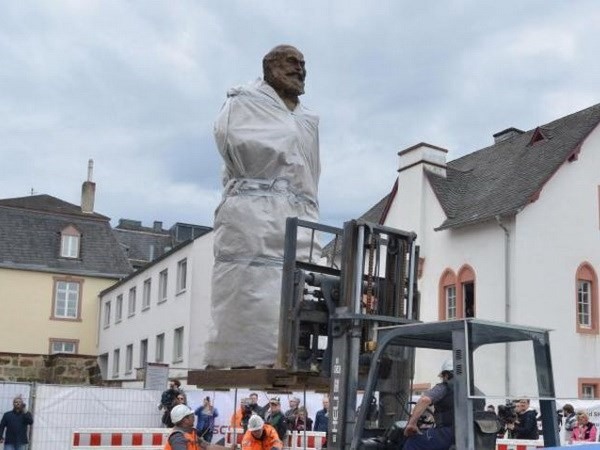 Politics & Law
Politics & Law

The scientific and revolutionary values of Karl Marx’s ideological heritage, and the significance of Marxism to the world and the Vietnamese revolution, were reiterated at an international scientific workshop held in Hà Nội yesterday, on the occasion of Marx’s 200th birth anniversary (May 5, 1818).
 |
| The scientific and revolutionary values of Karl Marx’s ideological heritage, and the significance of Marxism to the world and the Vietnamese revolution, were reiterated at an international scientific workshop held in Hà Nội yesterday, on the occasion of Marx’s 200th birth anniversary (May 5, 1818). — VNA/VNS Photo Dương Giang |
HÀ NỘI — The scientific and revolutionary values of Karl Marx’s ideological heritage, and the significance of Marxism to the world and the Vietnamese revolution, were reiterated at an international scientific workshop held in Hà Nội yesterday, on the occasion of Marx’s 200th birth anniversary (May 5, 1818).
Nguyễn Xuân Thắng, Secretary of the Communist Party of Việt Nam Central Committee, Chairman of the Central Theoretical Council and Director of the Hồ Chí Minh National Political Academy, stressed that the life and ideological heritage of Karl Marx have gone down in history, thus putting him among the greatest men in human history.
According to Thắng, among Marx’s huge theoretical heritage, the first to be mentioned are dialectic materialism and historical materialism, which gave progressive humankind, especially the working class, a great tool to gain awareness about and transform the world. This meant Marx had carried out a revolution in the entire perception of world history, as for the first time the developmental rules of human society were discovered, integrated and presented in a systematic manner. Thanks to this, humankind for the first time had a fairly complete theory on development.
Thắng said that by utilising dialectic materialism and historical materialism when researching the capitalist mode of production, Karl Marx outlined economic rules of the capitalist society and examined capitalism from its birth through its development, and ultimately to its annihilation. Another great discovery of Marx is the rule of surplus value, which is considered the “cornerstone” of Marxism as a whole.
With those two discoveries, Marx laid a firm foundation for the realisation of the ideology on scientific socialism – the theory on liberating the working class and humankind as a whole from all forms of slavery, oppression, exploitation and depravity.
Applying Marxism’s principles to the specific situation in Russia, V. I. Lenin further developed Marxism into Marxism-Leninism and brought about the success of the October Revolution in 1917.
In Việt Nam, President Hồ Chí Minh also employed and developed Marxism-Leninism in a creative manner to suit Việt Nam’s situation. Marxism-Leninism and Hồ Chí Minh Thought have become the ideological foundation of the Communist Party of Việt Nam, and served as the lodestar for Việt Nam’s revolution.
The Communist Party of Việt Nam (CPV) has led the Vietnamese people and nation in successfully conducting a revolution, and persistently pursuing the goals of national independence and socialism. From an underdeveloped country, Việt Nam has now entered a period of industrialisation, modernisation and international integration. The country’s position and role in the regional and global arena has been rising.
“The historic accomplishments of the more than 30 years of renewal again testify to the sustained vitality of Marxism-Leninism and Hồ Chí Minh Thought, and the legitimacy of the CPV’s guideline on building socialism,” Thắng said.
He affirmed that Marxism and Marxism-Leninism has and will be the torch for Việt Nam’s revolution in the new era.
In his paper presented at the workshop, Professor-Doctor Bunthua Khuamisay from the Lao National Political and Administrative Academy said Marxism is the most complete and solid theory of history, which proves that the cause of liberation of humanity is the cause of the working class, and the liberation of the working class is the core of human liberation.
He stressed that ever since its foundation, the Lao People’s Revolutionary Party has made Marxism-Leninism its ideological and theoretical foundation and the lodestar for Laos’ Revolution. Therefore, the research of and application of Marxism-Leninism is of utmost importance to the country.
The workshop’s organising board received nearly 100 research papers, including 26 from international scholars. The papers affirmed the scientific and revolutionary values of Marxism, laying stress on the creative application and development of Marxism in current socialist countries. They said important achievements, both theoretical and practical, in socialist countries have proved the legitimacy and vitality of Marxism in the present era. — VNS




